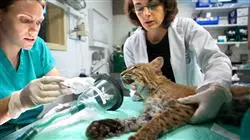University certificate
The world's largest faculty of veterinary medicine”
Introduction to the Program
A complete and fully up-to-date Postgraduate certificate in Wildlife Production and Health with the most complete and effective educational program in the online teaching market"

Recent globalization and its impact on animal health and, therefore, public health, is a topic of worldwide interest. The increase in international trade and structural changes in nation states have led to the emergence and spread of global health phenomena that represent risks, challenges and opportunities for producers and consumers. This is turn has posed serious challenges for health agencies, professionals and educational institutions.
In line with the concept of One Health, the professionals will be able to identify issues arising in veterinary medicine that also impact public health (such as zoonotic diseases and antibiotic resistance) and food safety.
The student will develop specialized knowledge of the documentation that the competent authorities need to be notified of and the procedure for sample collection and the operation of reference laboratories. Lastly, they will analyze the new challenges and advances in terms of animal health.
The Postgraduate certificate will deal in depth with the design of systems focused on the surveillance and study of wildlife diseases as a strategy for veterinary health prevention. It encourages the development of skills in the health management of wild animal populations in complex ecosystems, both humanized and natural.
Through this program, the veterinarian or related professional develops specialized knowledge in management and hunting management of wild species and intensive management for obtaining products and by-products from these species.
Through studying this course, the student will gain satisfaction in being able to apply the theoretical knowledge they acquired in concrete practical cases.
Join the elite, with this highly effective educational program and open new paths to help you advance in your professional progress"
This Postgraduate certificate in Wildlife Production and Health contains the most complete and up-to-date scientific program on the market. The most important features include:
- The latest technology in online teaching software
- A highly visual teaching system, supported by graphic and schematic contents that are easy to assimilate and understand
- Practical cases presented by practicing experts
- State-of-the-art interactive video systems
- Teaching supported by telepractice
- Continuous updating and recycling systems
- Autonomous learning: full compatibility with other occupations
- Practical exercises for self-assessment and learning verification
- Support groups and educational synergies: questions to the expert, debate and knowledge forums
- Communication with the teacher and individual reflection work
- Content that is accessible from any fixed or portable device with an Internet connection
- Supplementary documentation databases are permanently available, even after finishing the course
A complete educational program that will allow you to acquire the most advanced knowledge in all areas of veterinary intervention"
The teaching staff is made up of professionals from different fields related to this specialty. In this way, TECH makes sure to offer the educational update in line with its objective. A multidisciplinary team of professionals trained and experienced in different environments, who will develop the theoretical knowledge in an efficient way, but, above all, will put their own experience at the service of the professional.
This mastery of the subject matter is complemented by the effectiveness of the methodological design. Developed by a multidisciplinary team of e-learning experts. In this way, the professional will be able to study with a range of comfortable and versatile multimedia tools that will provide the operability needed in the field.
The design of this program is based on problem-based learning: an approach that conceives learning as an eminently practical process. To achieve this remotely, we will use telepractice learning: with the help of an innovative interactive video system, and Learning from an Expert.
With the experience of working professionals and the analysis of real success stories, in a high-impact training approach"

With a methodological design based on proven teaching techniques, this innovative program will take you through different teaching approaches to allow you to learn in a dynamic and effective way"
Why study at TECH?
TECH is the world’s largest online university. With an impressive catalog of more than 14,000 university programs available in 11 languages, it is positioned as a leader in employability, with a 99% job placement rate. In addition, it relies on an enormous faculty of more than 6,000 professors of the highest international renown.

Study at the world's largest online university and guarantee your professional success. The future starts at TECH”
The world’s best online university according to FORBES
The prestigious Forbes magazine, specialized in business and finance, has highlighted TECH as “the world's best online university” This is what they have recently stated in an article in their digital edition in which they echo the success story of this institution, “thanks to the academic offer it provides, the selection of its teaching staff, and an innovative learning method aimed at educating the professionals of the future”
A revolutionary study method, a cutting-edge faculty and a practical focus: the key to TECH's success.
The most complete study plans on the university scene
TECH offers the most complete study plans on the university scene, with syllabuses that cover fundamental concepts and, at the same time, the main scientific advances in their specific scientific areas. In addition, these programs are continuously being updated to guarantee students the academic vanguard and the most in-demand professional skills. In this way, the university's qualifications provide its graduates with a significant advantage to propel their careers to success.
TECH offers the most comprehensive and intensive study plans on the current university scene.
A world-class teaching staff
TECH's teaching staff is made up of more than 6,000 professors with the highest international recognition. Professors, researchers and top executives of multinational companies, including Isaiah Covington, performance coach of the Boston Celtics; Magda Romanska, principal investigator at Harvard MetaLAB; Ignacio Wistumba, chairman of the department of translational molecular pathology at MD Anderson Cancer Center; and D.W. Pine, creative director of TIME magazine, among others.
Internationally renowned experts, specialized in different branches of Health, Technology, Communication and Business, form part of the TECH faculty.
A unique learning method
TECH is the first university to use Relearning in all its programs. It is the best online learning methodology, accredited with international teaching quality certifications, provided by prestigious educational agencies. In addition, this disruptive educational model is complemented with the “Case Method”, thereby setting up a unique online teaching strategy. Innovative teaching resources are also implemented, including detailed videos, infographics and interactive summaries.
TECH combines Relearning and the Case Method in all its university programs to guarantee excellent theoretical and practical learning, studying whenever and wherever you want.
The world's largest online university
TECH is the world’s largest online university. We are the largest educational institution, with the best and widest online educational catalog, one hundred percent online and covering the vast majority of areas of knowledge. We offer a large selection of our own degrees and accredited online undergraduate and postgraduate degrees. In total, more than 14,000 university degrees, in eleven different languages, make us the largest educational largest in the world.
TECH has the world's most extensive catalog of academic and official programs, available in more than 11 languages.
Google Premier Partner
The American technology giant has awarded TECH the Google Google Premier Partner badge. This award, which is only available to 3% of the world's companies, highlights the efficient, flexible and tailored experience that this university provides to students. The recognition as a Google Premier Partner not only accredits the maximum rigor, performance and investment in TECH's digital infrastructures, but also places this university as one of the world's leading technology companies.
Google has positioned TECH in the top 3% of the world's most important technology companies by awarding it its Google Premier Partner badge.
The official online university of the NBA
TECH is the official online university of the NBA. Thanks to our agreement with the biggest league in basketball, we offer our students exclusive university programs, as well as a wide variety of educational resources focused on the business of the league and other areas of the sports industry. Each program is made up of a uniquely designed syllabus and features exceptional guest hosts: professionals with a distinguished sports background who will offer their expertise on the most relevant topics.
TECH has been selected by the NBA, the world's top basketball league, as its official online university.
The top-rated university by its students
Students have positioned TECH as the world's top-rated university on the main review websites, with a highest rating of 4.9 out of 5, obtained from more than 1,000 reviews. These results consolidate TECH as the benchmark university institution at an international level, reflecting the excellence and positive impact of its educational model.” reflecting the excellence and positive impact of its educational model.”
TECH is the world’s top-rated university by its students.
Leaders in employability
TECH has managed to become the leading university in employability. 99% of its students obtain jobs in the academic field they have studied, within one year of completing any of the university's programs. A similar number achieve immediate career enhancement. All this thanks to a study methodology that bases its effectiveness on the acquisition of practical skills, which are absolutely necessary for professional development.
99% of TECH graduates find a job within a year of completing their studies.
Postgraduate Certificate in Wildlife Production and Health
Due to the new international regulations regarding the monitoring, care, conservation and surveillance of wildlife, today there is a growing interest in hiring professionals in veterinary medicine specialized in the field. Understanding the constant academic updating as a fundamental requirement for an optimal occupational development in the area, in TECH Global University we have designed our Postgraduate Certificate in Wildlife Production and Health. This postgraduate course will deepen in the new methodologies and protocols used in the control and management of viral, bacterial and parasitic diseases affecting wild swine. In addition, it will address the updating of the professional's knowledge on the following topics: the new logistical aspects to be considered in the development of a wildlife sampling process; and the identification of the various care pathways in the management of bacterial, metabolic and fungal pathologies of avian affectation.
Study Online Postgraduate Certificate
Factors such as the effects of climate change and the appearance of new emerging diseases of animal affectation make wildlife care one of the most demanding veterinary specialties with respect to the degree of knowledge and preparation of its professionals. In our program, wildlife health will be approached from the integral view of its new fields of development, providing the veterinarian with the necessary tools to adequately address the current challenges of the sector. Likewise, this postgraduate course will delve into the modernization of the following aspects: the identification of the different viral and parasitic diseases that may affect wild carnivores; and the knowledge of the various health surveillance systems used in the monitoring and care of wildlife.







